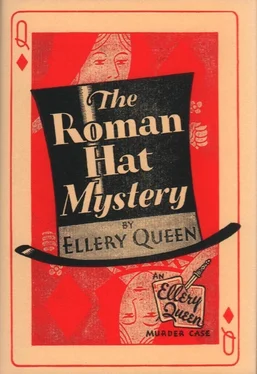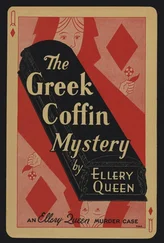“You’re very informative these days, my son,” said the Inspector petulantly. “Flint!”
The detective came forward.
“Flint,” said Queen, “you’ve had one pleasant job tonight and I’ve another for you. Think your back could stand a little more bending? Seems to me I remember you took a weightlifting contest in the Police Games when you were pounding a beat.”
“Yes, sir,” said Flint, grinning broadly. “I guess I can stand the strain.”
“Well, then,” continued the Inspector, jamming his hands into his pockets, “here’s your job. Get a squad of men together — good Lord, I should have brought the Reserves along with me! — and make an exhaustive search of every square foot of the theatre property, inside and out. You’ll be looking for ticket stubs, do you understand? Anything resembling half a ticket has to be in my possession when you’re through. Search the theatre floor particularly, but don’t neglect the rear, the steps leading up to the balcony, the lobby outside, the sidewalk in front of the theatre, the alleyways at both sides, the lounge downstairs, the men’s room, the ladies’ room — Here, here! That’ll never do. Call up the nearest precinct for a matron and have her do that Thoroughly clear?”
Flint was off with a cheerful nod.
“Now, then.” Queen stood rubbing his hands. “Mr. Panzer, would you step this way a minute? Very kind of you, sir. I’m afraid we’re making unholy nuisances of ourselves tonight, but it can’t be helped. I see the audience is on the verge of rebellion. I’d be obliged if you would trot up to the stage and announce that they will be held here just a little while longer, to have patience, and all that sort of thing. Thank you!”
As Panzer hurried down the center aisle, people clutching at his coat to detain him, Detective Hagstrom, standing a few feet away, caught the Inspector’s eye. By his side was a small slim youth of nineteen, chewing gum with vehement motions of his jaw, and obviously quite nervous at the ordeal he was facing. He was clad in a black-and-gold uniform, very ornate and resplendent, and incongruously fitted out with a starched shirt front and a wing collar and bow tie. A cap resembling the headgear of a bellboy perched on his blond head. He coughed deprecatingly as the Inspector motioned him forward.
“Here is the boy who says they don’t sell ginger ale in this theatre,” said Hagstrom severely, grasping the lad’s arm in a suggestive grip.
“You don’t, eh, son?” asked Queen affably. “How is that?”
The boy was plainly in a funk. His eyes rolled alarmingly as they sought the broad face of Doyle. The policeman patted him encouragingly on the shoulder and said to the Inspector, “He’s a little scared, sir — but he’s a good boy. I’ve known him since he was a shaver. Grew up on my beat. Answer the Inspector, Jessie...”
“Well, I–I don’t know, sir,” stammered the boy, shuffling his feet. “The only drinks we’re allowed to sell during the intermissions is orangeade. We got a contract with the---” — he mentioned the name of a well-known manufacturer of the concoction — “people and they give us a big discount if we sell their stuff and nobody else’s. So—”
“I see,” said the Inspector. “Are drinks sold only during intermissions?”
“Yes, sir,” answered the boy, more naturally. “As soon as the curtain goes down the doors to the alleys on both sides are opened, and there we are — my partner and me, with our stands set up, and the cups filled ready to serve.”
“Oh, so there are two of you, eh?”
“No, sir, three all together. I forgot to tell you — one feller is downstairs in the main lounge, too.”
“Ummmm.” The Inspector fixed him with a large and kindly eye. “Now, son, if the Roman Theatre sells nothing but orangeade, do you think you could explain how this ginger-ale bottle got here?”
His hand dove down and reappeared brandishing the dark-green bottle discovered by Hagstrom. The boy paled and began to bite his lips. His eyes roved from side to side as if they sought a quick avenue of escape. He inserted a large and dirty finger between his neck and collar and coughed.
“Why — why...” He had some difficulty in speaking.
Inspector Queen put down the bottle and rested his wiry length against the arm of a seat. He folded his arms sternly.
“What’s your name?” he demanded.
The boy’s color changed from blue-white to a pasty yellow. He furtively eyed Hagstrom, who had with a flourish taken a notebook and pencil from his pocket and was waiting forbiddingly.
The boy moistened his lips. “Lynch — Jess Lynch,” he said hoarsely.
“And where is your station between acts, Lynch?” said the Inspector balefully.
“I’m — I’m right here, in the left-side alley, sir,” stuttered the boy.
“Ah!” said the Inspector, knitting his brows ferociously. “And were you selling drinks in the left alley tonight, Lynch?”
“Why, why — yes, sir.”
“Then you know something about this ginger-ale bottle?”
The boy peered about, saw the stout small form of Louis Panzer on the stage, about to make an announcement, and leaning forward, whispered, “Yes, sir — I do know about that bottle. I–I didn’t want to tell before because Mr. Panzer’s a strict guy when it comes to breaking rules, and he’d fire me in a minute if he knew what I did. You won’t tell, sir?”
The Inspector started, then smiled. “Shoot, son. You’ve got something on your conscience — might as well get it off.” He relaxed and at a flick of a finger Hagstrom unconcernedly walked away.
“This is how it happened, sir,” began Jess Lynch eagerly. “I’d set my stand up in the alley here about five minutes before the end of the first act, like we’re supposed to. When the girl on this aisle opened the doors after the first act, I began to give the people comin’ out a nice refined selling chatter. We all do. A lot of people bought drinks and I was so busy I didn’t have time to notice anything going on around me. In a little while I had a breathing spell, and then a man came up to me and said, ‘Let me have a bottle of ginger ale, boy.’ I looked up and saw he was a ritzy feller in evening dress, actin’ kind of tipsy. He was laughing to himself and he looked pretty happy. I says to myself, ‘I bet I know what he wants ginger ale for!’ and sure enough he taps his back pocket and winks. Well—”
“Just a minute son,” interrupted Queen. “Ever see a dead man before?”
“Why — why, no, sir, but I guess I could stand it once,” said the boy nervously.
“Fine! Is this the man who asked you for the ginger ale?” The Inspector took the boy by the arm and made him bend over the dead body.
Jess Lynch regarded it with awed fascination. He bobbed his head vigorously.
“Yes, sir. That’s the gentleman.”
“You’re sure of that now, Jess?” The boy nodded. “By the way, is that the outfit he was wearing when he accosted you?”
“Yes, sir.”
“Anything missing, Jess?” Ellery, who had been nestling in a dark corner, leaned forward a little.
The boy regarded the Inspector with puzzlement on his face, looking from Queen to the body and back again. He was silent for a full minute, while the Queens hung on his words. Then his face lit up suddenly and he cried, “Why — yes, sir! He was wearin’ a hat — a shiny topper — when he spoke to me!”
Inspector Queen looked pleased. “Go on, Jess — Doc Prouty! It’s taken you a long time getting here. What held you up?”
A tall lanky man had come striding across the carpet, a black bag in his hand. He was smoking a vicious-looking cigar with no apparent concern for local fire rules, and appeared in something of a hurry.
Читать дальше












